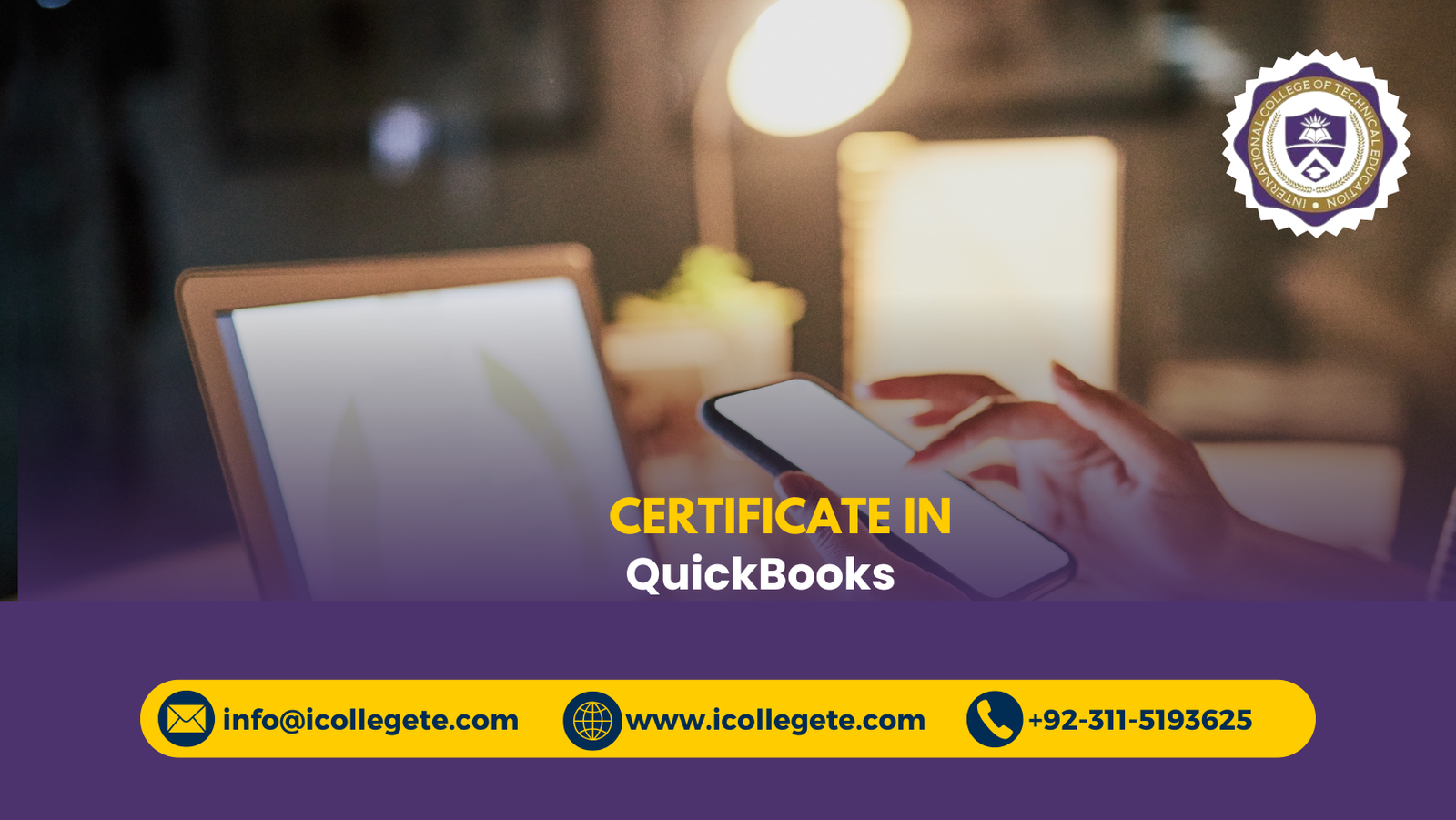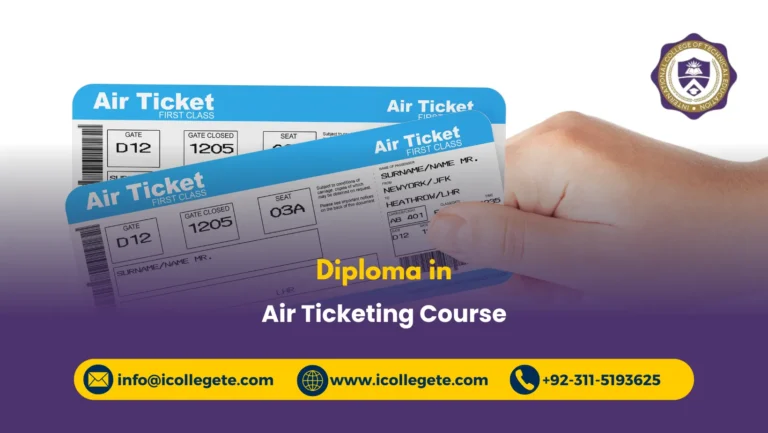In today’s fast-paced business environment, managing finances effectively is crucial to a company’s success. QuickBooks is one of the most widely used accounting software programs, particularly for small to medium-sized businesses, due to its ease of use and powerful features. The QuickBooks Course in Rawalpindi is designed to help individuals and business owners learn how to leverage this software to manage their financial operations efficiently. This course provides hands-on training in QuickBooks, equipping learners with the skills to manage accounts, track income and expenses, generate financial reports, and ensure overall financial health.
The QuickBooks Course offers comprehensive training in using QuickBooks accounting software. It is designed for individuals who want to gain a strong understanding of the software’s features and functions. Whether you are a business owner looking to manage your company’s finances or an aspiring accountant, this course will teach you the essential tools and techniques for handling day-to-day accounting tasks using QuickBooks. By the end of the course, participants will be able to use the software to track financial transactions, create invoices, manage payroll, and prepare financial reports with ease.
This course provides in-depth knowledge of the features and functions of QuickBooks. From setting up a company file to managing accounts payable and receivable, participants will learn how to use QuickBooks effectively to streamline financial tasks. The course includes both theoretical lessons and practical exercises, ensuring that learners can apply their knowledge in real-world scenarios. Topics such as creating financial reports, managing inventory, and handling payroll will be covered, making this course ideal for individuals who wish to master QuickBooks and improve their financial management skills.
Study Units
The QuickBooks Course is structured into several modules, each focusing on a specific aspect of using QuickBooks accounting software:
- Introduction to QuickBooks
- Understanding the basics of QuickBooks and its importance in business accounting.
- Navigating the QuickBooks interface and setting up the software.
- Setting Up a Company
- Creating and configuring a company file.
- Setting up a chart of accounts and customizing settings for your business needs.
- Managing Financial Transactions
- Recording and categorizing sales, expenses, and income.
- Using invoices, sales receipts, and bills to track transactions.
- Managing Accounts Payable and Accounts Receivable
- Recording bills and tracking payments.
- Managing customer payments and handling overdue invoices.
- Inventory Management
- Tracking inventory and recording purchases and sales of products.
- Setting up and using QuickBooks to manage stock levels.
- Payroll Management
- Setting up employee payroll in QuickBooks.
- Managing payroll calculations, deductions, and generating payroll reports.
- Generating Financial Reports
- Creating and customizing financial reports such as profit and loss statements, balance sheets, and cash flow statements.
- Analyzing financial data to make informed business decisions.
- Taxation and Compliance
- Setting up and calculating taxes using QuickBooks.
- Filing tax returns and ensuring compliance with local tax regulations.
- Advanced Features and Troubleshooting
- Exploring advanced features such as budget creation, forecasting, and custom reporting.
- Troubleshooting common issues and ensuring your data is accurate and secure.
Learning Outcomes
Upon successful completion of the QuickBooks Course, participants will:
- Understand the core features of QuickBooks and how to navigate the software effectively.
- Be able to set up a QuickBooks company file and customize it to fit business needs.
- Know how to record and track financial transactions, including sales, expenses, and income.
- Be proficient in managing accounts payable and receivable, including handling customer payments and vendor bills.
- Be able to manage inventory and track stock levels using QuickBooks.
- Know how to set up and manage payroll, including calculating deductions and generating payroll reports.
- Be skilled in creating and analyzing financial reports to assess the financial health of a business.
- Understand the tax functionalities in QuickBooks and be able to generate reports for tax filing.
- Be familiar with troubleshooting common issues and maintaining accurate financial records.
Course Benefits
- Increased Efficiency: Learn how to automate financial processes and reduce the time spent on accounting tasks.
- Industry-Relevant Skills: Gain practical experience with one of the most widely used accounting software programs.
- Improved Financial Management: Manage your business finances with greater accuracy and efficiency.
- Career Advancement: This course opens up career opportunities in accounting, finance, and business management for individuals with QuickBooks expertise.
- Ease of Use: QuickBooks is user-friendly, making it easier to handle complex accounting tasks without needing extensive training or experience.
- Compliance Assurance: Learn how to use QuickBooks to ensure that your business stays compliant with tax laws and other regulations.
- Real-World Application: The course includes hands-on training, giving you practical experience in using QuickBooks to manage day-to-day accounting tasks.
Who Is This Course For?
The QuickBooks Course is ideal for:
- Small Business Owners: Individuals who want to manage their business’s finances more effectively using QuickBooks.
- Aspiring Accountants: Those looking to develop their skills and gain expertise in using QuickBooks for accounting purposes.
- Freelancers: Self-employed individuals who need to track their income and expenses and generate invoices.
- Office Administrators: Professionals responsible for managing business finances and accounting tasks.
- Students: Individuals pursuing a career in accounting or finance who want to gain practical experience with QuickBooks.
- Finance Professionals: Accountants or bookkeepers who want to enhance their knowledge of QuickBooks and improve their software skills.
No prior experience with QuickBooks is required, although a basic understanding of accounting principles will be helpful.
Future Progression
After completing the QuickBooks Course, participants can pursue several career pathways or further studies to expand their knowledge and expertise:
- Advanced Accounting Courses: For those interested in deepening their accounting knowledge, pursuing certifications such as ACCA, CPA, or CMA can help further career progression.
- QuickBooks Certification: Becoming a QuickBooks Certified ProAdvisor can enhance your credentials and increase your job opportunities in accounting or bookkeeping.
- Business Management: Apply your accounting skills to broader business management roles, where financial oversight is critical.
- Financial Analysis: With experience in QuickBooks, you can move into more specialized areas of financial analysis, budgeting, and forecasting.
- Freelancing or Consultancy: Offer your QuickBooks expertise as a freelance accountant or consultant to small businesses that need assistance with their financial management.
- Entrepreneurship: If you plan to run your own business, mastering QuickBooks will be invaluable in handling your company’s accounting and financial management tasks.
The QuickBooks Course in Rawalpindi provides essential training for anyone looking to streamline their accounting processes and manage finances more efficiently. With practical, hands-on experience in QuickBooks, participants will be able to handle various accounting tasks with ease, whether for a small business or personal use. This course is ideal for individuals who want to gain valuable accounting skills, improve financial decision-making, and open up a wide range of career opportunities in accounting and finance.





